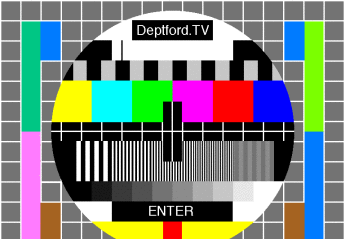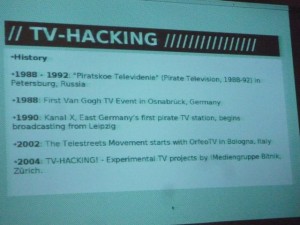During May (12th May till 1st June), Deptford.TV will host in collaboration with CUCR, http://dek.spc.org and http://www.bitnik.org a three weeks long hands on database filmmaking workshop, in which we will do some serious tv hacking, editing and uploading to Deptford.TV, a public database of documentary film and video to help annotate the urban change in Deptford and across SE London.
We invite you to take part in 4 workshop days over the period of three weeks plus to walk with the !Mediengruppe Bitnik artists through Deptford.
The workshops are free but places are limited, to book, please send an email to a.hadzi@gold.ac.uk and state workshop days you want to attend (it is first come first serve & priority is given to those able to attend all four days).
cheers,
adnan
Programme:
*Workshop Day #1: A hack a day*
Tuesday, 12th May, 11am till 5pm (take your cameras!)
After a short introduction to Sousveillance and CCTV film making, we will set out on a walk through Deptford. Equipped with CCTV video signal receivers we will let the incoming surveillance camera signals lead us through the city. The CCTV video signal receivers will catch surveillance camera signals in public and private spaces and make them visible: surveillance becomes sousveillance. By making images visible which normally remain hidden, we gain access to the “surveillance from above” enabling us to use these images for a personal narrative of the city.
Workshop with construction manual for later DIY! Attendance free Whoever has handycam, bring it! (plus cable and fully charged battery!)).
*Workshop Day #2: Collaborative Editing*
Monday, 18th May, 11am till 5pm (take your laptops!)
Introduction into Cinelerra & pure:dyne:
“Working with digital video is part of many artistic disciplines. Besides single screen narratives, video productions can range from animation, multiple screen installation to interactive work. Still, many aspects of digital video can be traced back to the history of film. The interface of a timeline editing software such as Cinelerra shows a multitrack timeline, a viewing monitor, a bin for clips; echoing the setup of a flatbed table for editing celluloid.” (digital artists handbook)
*Workshop Day #3: Deptford.TV database*
Monday, 25th May, 11am till 5pm (take your laptops!)
Introduction into the Deptford.TV database & how to use the alternative subversion control workflow:
“When you start working with free software as a videomaker, it is likely that you need to invest some time and energy in understanding certain basics of the video production process. Sometimes this might mean you have to look for alternative workflows, to dive ‘under the hood’ of a digital tool, or reconfigure an existing solution to suit your needs. Investigating the tools you use as a video maker is an important part of the job, it can help gain insights, it can be an inspiration to explore new ways of working and imagemaking.” (digital artists handbook)
*Workshop Day #4: pic nic*
Monday, 1st June, in the afternoon (take food & drinks!)
If the weather permits we will go to Greenwich Park and screen the films on portable screens while enjoying the spring/summer, tba!
The events are free, but places are limited. *to book please email* a.hadzi@gold.ac.uk
*supported by:*
Arts Council of England http://www.artscouncil.org.uk/
LCACE http://www.lcace.org.uk/
*Further infos:*
http://deptford.tv
Deptford.TV is a project focusing on collaborative film – initiated by Adnan Hadzi in collaboration with the Deckspace media lab, Bitnik media collective, Boundless project, Liquid Culture initiative, and Goldsmiths College.
It is an online media database documenting the urban change of Deptford, in South East London. Deptford TV functions as an open, collaborative platform that allows artists, filmmakers and people living and working around Deptford to store, share, re-edit and redistribute the documentation of the regeneration process.
The open and collaborative aspect of the project is of particular importance as it manifests in two ways: a) audiences can become producers by submitting their own footage, b) the interface that is being used enables the contributors to discuss and interact with each other through the database.
Deptford TV is a form of “television”, since audiences are able to choose edited “time lines” they would like to watch; at the same time they have the option to comment on or change the actual content. Deptford TV makes us of licenses such as the creative commons sa-by and gnu general public license to allow and enhance this politics of sharing.
*http://www.bitnik.org*
!Mediengruppe Bitnik is a media collective that became notorious, amongst others, by bugging the Zurich opera with radio transmitters and offering free live telephone broadcasts of the opera performances to the neighborhood, aesthetic hacking of movie files, and a pirate TV station based on media illegally downloaded from the Internet. The group does not understand hacking as a cult of technology geeks, but as a social intervention and practice everyone can adopt. To this end, they have been touring with their workshop series ,,A Hack a Day“, inviting and working with local and international artists.

